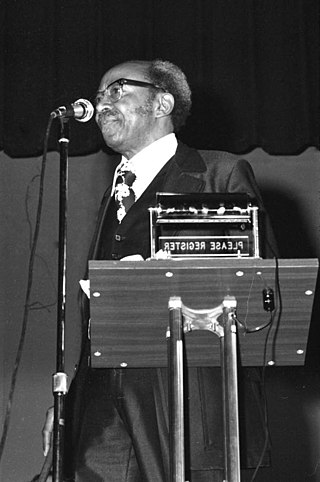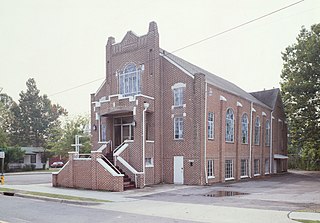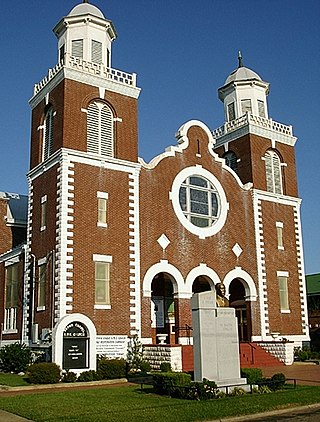
The Civil Rights Memorial is an American memorial in Montgomery, Alabama, created by Maya Lin. The names of 41 people are inscribed on the granite fountain as martyrs who were killed in the civil rights movement. The memorial is sponsored by the Southern Poverty Law Center.

Edgar Daniel Nixon, known as E. D. Nixon, was an American civil rights leader and union organizer in Alabama who played a crucial role in organizing the landmark Montgomery bus boycott there in 1955. The boycott highlighted the issues of segregation in the South, was upheld for more than a year by black residents, and nearly brought the city-owned bus system to bankruptcy. It ended in December 1956, after the United States Supreme Court ruled in the related case, Browder v. Gayle (1956), that the local and state laws were unconstitutional, and ordered the state to end bus segregation.

The Martin Luther King Jr. National Historical Park covers about 35 acres (0.14 km2) and includes several sites in Atlanta, Georgia related to the life and work of civil rights leader Martin Luther King Jr. Within the park is his boyhood home, and Ebenezer Baptist Church — the church where King was baptized and both he and his father, Martin Luther King Sr., were pastors — as well as, the grave site of King, Jr., and his wife, civil rights activist Coretta Scott King.
The Montgomery Improvement Association (MIA) was formed on December 5, 1955 by black ministers and community leaders in Montgomery, Alabama. Under the leadership of Ralph Abernathy, Martin Luther King Jr. and Edgar Nixon, the MIA was instrumental in guiding the Montgomery bus boycott, a successful campaign that focused national attention on racial segregation in the South and catapulted King into the national spotlight.
Dr. Vernon Johns was an American minister based in the South and a pioneer in the civil rights movement. He is best known as the pastor (1947–52) of the Dexter Avenue Baptist Church in Montgomery, Alabama. He was succeeded there by Dr. Martin Luther King Jr.

The 16th Street Baptist Church is a Baptist church in Birmingham, Alabama, United States. In 1963, the church was bombed by Ku Klux Klan members. The bombing killed four young girls in the midst of the Civil Rights Movement. The church is still in operation and is a central landmark in the Birmingham Civil Rights District. It was designated as a National Historic Landmark in 2006. Since 2008, it has also been on the UNESCO list of tentative World Heritage Sites.
"Mother" Pollard was an American church elder who participated in the 1955–1956 Montgomery bus boycott. She has been called a civil rights hero for her tenacity in soothing the spirit of her pastor, Martin Luther King Jr.
The Women's Political Council (WPC), founded in Montgomery, Alabama, was an organization that formed in 1946 that was an early force active in the civil rights movement that was formed to address the racial issues in the city. Members included Mary Fair Burks, Jo Ann Robinson, Maude Ballou, Irene West, Thelma Glass, and Euretta Adair.

Charles Kenzie Steele was a preacher and a civil rights activist. He was one of the main organizers of the 1956 Tallahassee bus boycott, and a prominent member of the Southern Christian Leadership Conference. On March 23, 2018, Florida Governor Rick Scott signed CS/SB 382 into law, designating portions of Florida State Road 371 and Florida State Road 373 along Orange Avenue in Tallahassee as C.K. Steele Memorial Highway.
Abraham Lincoln DeMond was an American minister and advocate for African-American emancipation in the late 19th and early 20th centuries. On January 1, 1900, at Dexter Avenue Baptist Church, he gave a speech, The Negro Element in American Life, which was his only published work.

Bethel Baptist Church is a Baptist church in the Collegeville neighborhood of Birmingham, Alabama. The church served as headquarters from 1956 to 1961 for the Alabama Christian Movement for Human Rights (ACMHR), which was led by Fred Shuttlesworth and active in the Birmingham during the Civil Rights Movement. The ACMHR focused on legal and nonviolent direct action against segregated accommodations, transportation, schools and employment discrimination. It played a crucial role in the 1961 Freedom Rides that resulted in federal enforcement of U.S. Supreme Court and Interstate Commerce Commission rulings to desegregate public transportation.

Brown Chapel A.M.E. Church is a church at 410 Martin Luther King Jr. Boulevard in Selma, Alabama, United States. This church was a starting point for the Selma to Montgomery marches in 1965 and, as the meeting place and offices of the Southern Christian Leadership Conference (SCLC) during the Selma Movement, played a major role in the events that led to the adoption of the Voting Rights Act of 1965. The nation's reaction to Selma's "Bloody Sunday" march is widely credited with making the passage of the Voting Rights Act politically viable in the United States Congress.

The sermons and speeches of Martin Luther King Jr., comprise an extensive catalog of American writing and oratory – some of which are internationally well-known, while others remain unheralded and await rediscovery.
Montgomery, Alabama, was incorporated in 1819, as a merger of two towns situated along the Alabama River. It became the state capital in 1846. In February 1861, Montgomery was selected as the first capital of the Confederate States of America, until the seat of government moved to Richmond, Virginia, in May of that year. During the mid-20th century, Montgomery was a primary site in the Civil Rights Movement, including the Montgomery bus boycott and the Selma to Montgomery marches.

The First Baptist Church on North Ripley Street in Montgomery, Alabama, is a historic landmark. Founded in downtown Montgomery in 1867 as one of the first black churches in the area, it provided an alternative to the second-class treatment and discrimination African-Americans faced at the other First Baptist Church in the city.

The Gerald–Dowdell House, in Montgomery, Alabama, was built c.1854. It was listed on the National Register of Historic Places in 1980.
The history of the 1954 to 1968 American civil rights movement has been depicted and documented in film, song, theater, television, and the visual arts. These presentations add to and maintain cultural awareness and understanding of the goals, tactics, and accomplishments of the people who organized and participated in this nonviolent movement.

The Holt Street Baptist Church is a historic Baptist church in Montgomery, Alabama, United States.

Theodora Smiley Lacey is an American civil rights activist and educator. She helped organize the Montgomery bus boycott, fought for voting rights and fair housing, and helped lead the effort to integrate schools in New Jersey.



















